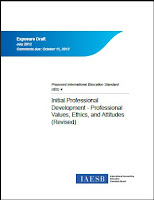The academic research literature suggests that an
understanding of “profession” and “professionalism” cannot ignore a
post-professionalism perspective. Professions and the notion of professionalism
are undergoing rapid change in a new global information age which necessitates
new theories and explanations.
Post-professionalism is characterized by loss of
exclusivity, increased segmentation through specialization of knowledge and the
growth of technology. As a result, the services previously delivered
exclusively by members of formal professions can now be delivered by general
professionals or even non-professionals. The 1980s and 1990s witnessed a
proliferation of studies of professionals, professions and processes of
professionalization. Professional closure is often discussed in relation to
education practices and struggles between the state and professional
associations about regulations over practice rights and, similarly,
professional regulation is typically viewed as involving struggles over
accounting and auditing laws and standards.
A recent research study offers an innovative approach to the
research on “professionalism” for a specific profession, that of the Certified
Financial Planner (CFP). The study uses a framework which distinguishes between
the ‘what’ and ‘how’ aspects. The ‘what’ aspect of the experience is the direct
object of experiencing the professionalism of financial planners; the ‘how’
aspect is the act of experiencing the phenomenon. The indirect object that is
the intention behind the act is not the focus of this study (see Figure 1 below).
This study considers the CFP certification requirements in
Australia, Hong Kong and the United States. These requirements establish a
framework for professionalism, but they are not the only influences. CFP
professionals are also influenced by their work through the behaviour and standards
of their employer and by government licensing and regulation. This paper
describes the variations in how CFP professionals experience professionalism in
each country.
The significance of this study is that identifies the
elements of professionalism that CFP’s experience as being part of the
professionalism of financial planners. Much of the existing research on the
professions and professionalism focuses on historical perspectives and on
identifying the characteristics that distinguish a profession and a
professional from a sociological viewpoint.
In summary, the purpose of this paper is to present the
preliminary findings of conceptions of professionalism of CFP’s from each of
the three countries independently. The major finding of the research is that
CFP professionals experience professionalism in ways that reflects the factors
that influence their professionalism. Professionalism is experienced as putting
the client’s interest first, being knowledgeable as evidenced by professional
credentials, following a planning process and being guided by regulation and
standards.
For more information, see the research paper “
What and how financial planners experience professionalism: a phenomenographic study (preliminary findings)” by: Associate Professor Ken Bruce (CEO/Campus
Director, CQU Institute of Higher Learning); Dr Abdullahi Ahmed (Senior
Lecturer in Finance, School of Commerce & Law, CQUniversity, Rockhampton,
Australia); and Dr Helen Huntly (Professor, Dean, School of Education,
CQUniversity, Bundaberg, Australia).





